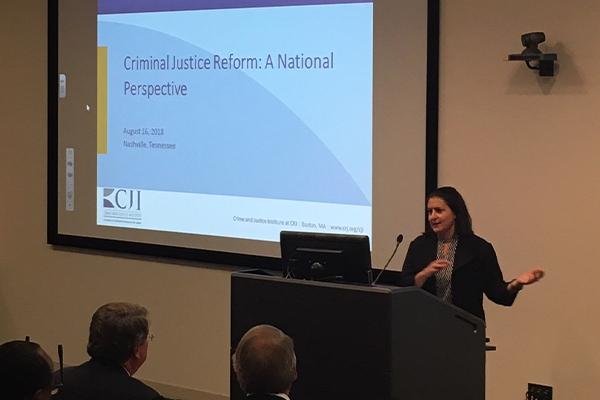
NASHVILLE – A diverse group of state leaders explored the challenges of responding to behavioral health issues, reducing recidivism, and other pressing needs facing Tennessee’s criminal justice system this week at a forum hosted by the Crime and Justice Institute (CJI) and the office of Gov. Bill Haslam.
The forum, held Aug. 16 and 17, brought together leaders representing state and local agencies and other stakeholders throughout the state, as well as experts on recidivism reduction, the intersection between the criminal justice system and behavioral health issues, and criminal justice reform across the country. The event highlighted innovative practices across the state and represented a first step in building pathways for continued criminal justice reform efforts and developing partnerships to further those efforts.
Funded by the Department of Justice’s Bureau of Justice Assistance, the Tennessee forum was the first in a series that CJI will host in the coming months focusing on the criminal justice system in different states, the challenges they face, and opportunities for improvement.
“The state forums represent an exciting opportunity for CJI to partner with states to explore promising practices, areas for growth, and how stakeholders may collaborate to improve outcomes,” said CJI Director of Justice Initiatives Barbara Pierce.
The first day of the Tennessee forum looked at the current criminal justice landscape, beginning with an introduction by Todd Skelton, deputy counsel to Gov. Haslam. Department of Correction Commissioner Tony Parker presented on the current state of corrections in Tennessee, followed by a presentation on juvenile justice by Senate Majority Leader Mark Norris, Department of Children’s Services Deputy Commissioner Debbie Miller, and Clark Milner, assistant deputy counsel to Gov. Haslam.
CJI’s Barbara Pierce provided the national perspective of the last decade of criminal justice reform, focusing on national data and outcomes from states that have undertaken significant changes. And a panel discussion featuring Judge O. Duane Slone, District Attorney General Amy Weirich, Department of Correction Senior Management Consultant Dr. Mary Karpos, Public Defender John Partin, and Julie Warren, State Director for Right on Crime, explored promising practices and pathways to future reform.
The second day of the forum focused on the intersection of behavioral health and the criminal justice system in Tennessee. CJI Senior Policy Specialist Lisa Margulies kicked off the day with a presentation on criminal justice responses to behavioral health challenges. Department of Mental Health and Substance Abuse Services (TDMHSAS) Commissioner Marie Williams provided an update on the status of behavioral health in Tennessee, outlining the range of programming for Tennesseans addressing behavioral health needs and emphasizing the impact of these programs on individuals’ lives.
Dr. Edward Latessa from the University of Cincinnati, a national expert on criminology, spoke about solutions to reduce recidivism based on the current research. Finally, a panel featuring Dr. Latessa, Police Chief Kevin Arnold, Sheriff Daron Hall, and TDMHSAS’s Ellen Abbott discussed behavioral health needs in the criminal justice system from the national and local perspective.
“We were honored to partner with CJI to host the State Forum on Public Safety,” said Governor Bill Haslam. “This forum underscores Tennessee’s commitment to finding effective methods for reducing recidivism and addressing behavioral health in criminal justice, which are critical to reducing crime across the state.”